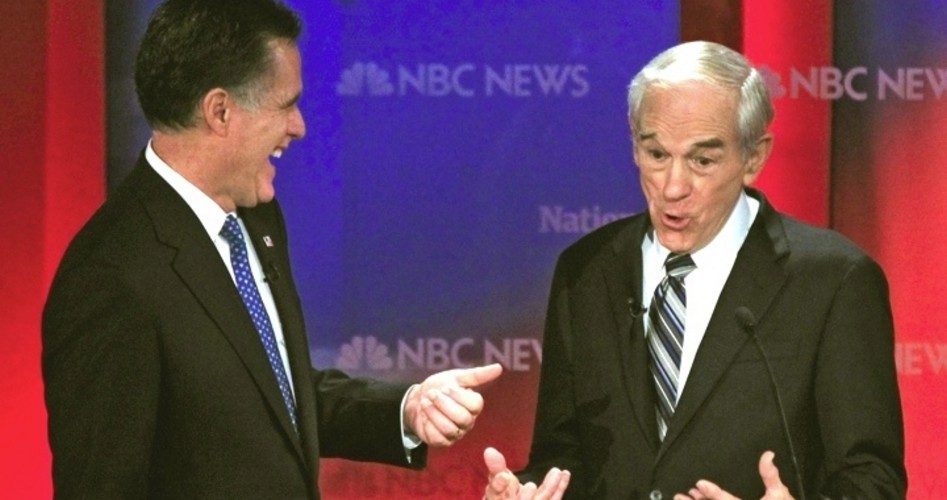
Ron Paul, the maverick Texas congressman who has twice run for the Republican presidential nomination, won’t endorse the nominee of his party. Though Paul said last week it was “very unlikely” he would endorse former Massachusetts Governor Mitt Romney, he made it definitive in an interview October 12 on the CNBC program Futures Now.
“No,” he said, plainly and unequivocally, when asked about an endorsement. Neither the GOP challenger nor President Obama will change the course of fiscal and monetary policy that is leading to what has been called the “fiscal cliff,” Paul said, because both are captive of special interests. And neither will act to stop the Federal Reserve from papering over the growing chasm of debt by inflating the money supply in a policy called “quantitative easing.”
“Both [are] within the establishment where they need the Federal Reserve as lender of last resort to make sure that you can take all the risk in the world,” Paul said, describing the “Fed” as an essential prop of what is essentially a “one-party system” in which both Republicans and Democrats refuse to cut federal spending.
“I’ve been in this business a long time,” said the 12-term congressman, “and believe me, there is essentially no difference from one administration to another, no matter what the platforms [say]. The foreign policy stays the same, the monetary policy stays the same, there’s no proposal for any real cuts and both parties support it.”
Economic analysts are warning the already weak economy will be knocked back into recession by the December 31 expiration of personal and business tax cuts, an increase in the alternative minimum tax and the beginning of taxes related to the “ObamaCare” health care law — all combined with “across the board” spending cuts required by the sequester provision of the agreement to raise the debt ceiling made in Congress on August 1, 2011. In agreeing to an increase in the government’s borrowing authority, the lawmakers stipulated that automatic spending cuts would occur unless Congress acted to reduce annual spending increases and lower the nation’s debt, now pegged at more than $16 trillion. According to the financial journal Barron’s, more than 1,000 government programs, including military spending and Medicare, will face steep cuts. Though some analysts claim the effect will be gradual, calling it more of a “fiscal slope” than a “cliff,” nearly all agree the direction for the economy will be downward.
“They’re not going to allow all those terrible things to happen on January 1, but they’re not going to solve the problem either,” Paul said. But as the Federal Reserve begins a third round of quantitative easing, called “QE3,” the Texas congressman warned the cheap money policy will wreak havoc on the nation’s economy.
“Eternities with QEs are going to happen,” said Paul, warning that Federal Reserve Chairman Ben Bernanke “will destroy the dollar if we don’t come to our senses, and really cut spending and live within our means.”
Paul, author of the bestseller End the Fed, has made opposition to the Federal Reserve a hallmark of his political career since he was first elected to Congress in 1976. He made the formerly dry subject of monetary policy a rallying point for both his 2008 and 2012 presidential campaigns, with large crowds of college students and their elders enthusiastically cheering his call for abolishing the Federal Reserve System, created by Congress in 1913. His bill to audit the independent, privately owned central bank finally passed in the House this July by a lopsided 327-98 vote, despite Chairman Bernanke’s objection that an audit would result in a “nightmare scenario” of political meddling in monetary policy. That argument had gone unchallenged by most members of Congress for decades. But many of the actions during and after the financial crisis of 2008 caused some lawmakers to question whether the “Fed” had not in fact encroached upon the authority of Congress with some of the extraordinary measures taken to rescue banks and buy mortgage and U.S. Treasury debt.
“I don’t know how anybody could be against transparency,” Paul said during debate on the bill, arguing that the American people have a right to know the details of the Fed’s rescue deals and its support of foreign central banks.
“It’s time that we stood up to the Federal Reserve that right now acts like some kind of high, exalted priesthood, unaccountable to democracy,” Rep. Dennis Kucinich, (D-Ohio) charged during the House debate. A companion bill in the Senate has been introduced by Paul’s son Rand, a Kentucky Republican, though there is little chance of it passing this year.
The elder Paul, a 77-year-old retired obstetrician, is leaving Congress at the end of this year, having decided not to run for another term. Though a Republican throughout his career, he bolted the GOP to run as the presidential candidate of the Libertarian Party in 1988, drawing less than one percent of the popular vote. In an interview on the Fox Business channel last week, he hinted he might vote this year for the Libertarian Party candidate for president, Gary Johnson, the former two-term governor of New Mexico.
“There are other people who are technically capable of winning because they’re on a lot of ballots,” Paul said about alternatives to Romney or Obama.
“Like Gary Johnson, for example,” the interviewer suggested.
“Yeah,” Paul replied, though he did not say whether he would endorse or vote for Johnson
Photo: In this Jan. 23, 2012 file photo, Republican presidential candidates Rep. Ron Paul Paul and Mitt Romney share a laugh during a break in a Republican presidential debate at the University of South Florida in Tampa: AP Images

